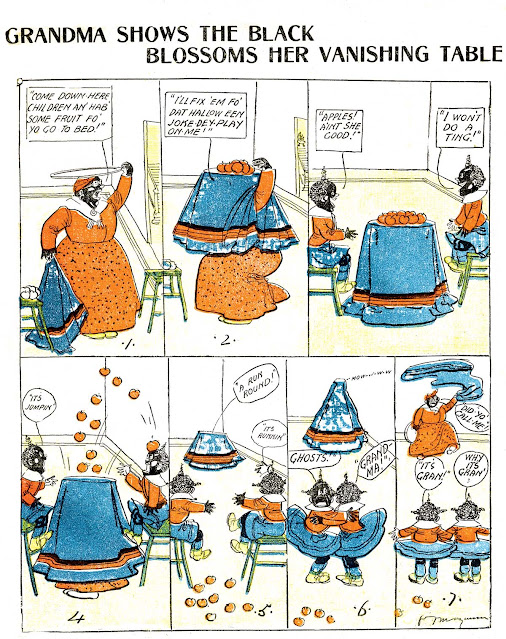Saturday, July 30, 2022
Herriman Saturday: April 15 1910
April 15 1910 -- The belongings of a married woman don't amount to much in 1910, it seems.
A man brings lawsuit against a hotel, because his wife's expensive furs were stolen during their stay. The opposing legal team brings up an important point -- does the husband actually have the right to bring suit when the clothes stolen were not his but his wife's? The judge asks the man if he paid for his wife's clothes. Yes, is the answer. Did he specifically state to her that the clothes were given to her as gifts? No, is the answer. The judge rules then that the clothes belong to the husband, not the wife, and he is within his rights to bring suit. His better half merely wears those things, while ownership stays squarely with the purchaser.
While the newspapers play up the anti-feminist aspect of this ruling, in fact, says legal scholar 'Stripper' Holtz, that judge in 1910 seems like he was on solid ground. Feminism, suffrage, women's rights, etc., just don't enter into the calculus of this situation, one in which merely the ownership of an article is determined by who paid for it.
Labels: Herriman's LA Examiner Cartoons
Friday, July 29, 2022
Obscurity of the Day: Grandma and her Little Black Blossoms
The popular comic strip Foxy Grandpa was about a jolly old codger and his young nephews. The typical plot of the strip was that the nephews would try to pull a trick on Foxy Grandpa, but he'd outsmart them and turn the gag right back on them.
Like most popular strips, Foxy Grandpa inspired imitators, and today we have one that recasts the characters as black, and grandpa is changed to a grandma. Because it ran as a small quarter-page strip, the gags were simplified such that the kids don't get to plan a trick -- grandma just plays a trick on them unprovoked. Grandma and her Little Black Blossoms ran occasionally in the Boston Globe Sunday comics section from November 1 1903 until January 31 1904*. The creator was James J. Maguinnis, who offered up quite a few forgettable series for the Globe in the 1900s.
* Source: Dave Strickler's Boston Globe index
Labels: Obscurities
Were the Boston Globe's cartoons syndicated at all in these earlier years? I've understood the tried maybe in the 1930s, but if they did, it was a feeble effort.
So pathetic as the effort was, yes, they were shopping their wares around!
--Allan
Wednesday, July 27, 2022
Early Eddie Eks Cartoon
Eddie Eksergian's cartooning career prior to 1901 is pretty much a blank for me; it was that year that he published his first series with both the McClure Syndicate, based in New York, and World Color Printing, based in St. Louis. But those are series cartoons, and those were the exception rather than the rule in those days. Above is a one-shot cartoon I recently found in the Sunday section of the New York Herald for November 14 1897, over three years before he'd pen his first series cartoon,when Eddie was just 24 years old.
Eddie was living in Brooklyn at this time, so it's not surprising that he was shopping cartoons around at the New York papers. His trademark zaniness is not in evidence; this cartoon is a pointed little political barb about women's suffrage, made theoretically funny because the giver and receivers are both little kids.
The circumstances shown in the cartoon are a mystery -- it is supposed to occur the day after elections, but November 1897 was an off-year. The only important election in New York that year was for a judgeship, and my research doesn't seem to indicate that suffrage was an issue in it. It doesn't even seem to refer back to the 1896 presidential election, as McKinley was famously silent on the suffrage issue, and his wife was very much for it. So what election this cartoon refers to I cannot say.
Monday, July 25, 2022
Selling It: Li'l Abner Cleans Up His Act
A lot of comic character marketing tie-ins make no sense to me (like our recently featured Dick Tracy ad for caramels...), but here we have a marriage made in heaven. If anyone needs a good laundry detergent, and will put it through a torture test, it's gotta be the denizens of Dogpatch.
In June 1952, the good folks with Surf detergent paired up with Al Capp's characters for a $100,000 contest, where in order to win you just have to give Daisy Mae some magic words to say about the wonders of her detergent. It seems like a wonderful idea, but the weird part is that the newspaper campaign came and went in practically no time. Seems like for $100 grand (in 1952 dollars!) you'd want to beat this contest's drum for months and months, but the whole thing seems to have come and gone in a month or even less.
Weirder yet, after the contest was over, I could find only a single report about a Texas lady who won third prize. Her local paper showed the photo op of her getting the check. The Surf people put not one single dime into advertising the contest results, and if they did send out publicity releases, I can find not one single paper that ran them. So $100 large later, we never found out who won the $10,000 first prize, nor what honey-soaked words they'd written to win the contest. Can anyone find a source for the contest results somewhere?
Labels: Advertising Strips
Sunday, July 24, 2022
Wish You Were Here, from Grace Drayton
Grace Drayton's postcard series for Reinthal & Newman (penned under her married name of Wiederseim) highlights her wicked sense of humour hidden behind a guise of cloying cuteness. This card is #112 in the series.
Labels: Wish You Were Here






